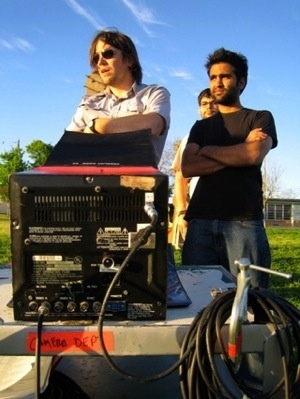
Anish Savjani (on the right) on the set of GRETCHEN, the first feature film project of filmscience
Since establishing his production company filmscience in 2005, Anish Savjani has been producing films that are turning into milestones in the independent film scene. While Old Joy is praised as "A true American independent film" by the Boston Globe, The New York Times critics pick Wendy and Lucy is described as a simple story that matters a lot and is beautifully told. Savjani is also the producer of three films directed by Joe Swanberg, a member of the Mumblecore movement. We talked to the talented producer about Wendy and Lucy, financing, new distribution platforms, and much more.
F.A. Let’s start with Wendy and Lucy. How did you get involved in this project?
A.S. I had worked with director Kelly Reichardt before on her previous film
Old Joy, so when I heard about this project, I was excited to be involved.
F.A. Were there any difficulties you dealt with in the financing of this film?
A.S. It’s usually the same with every project. Difficulties come with all of them. But luckily I was already familiar with Kelly’s approach as a filmmaker. So when I was reading the material, I knew about the approach she was going to take with this film.
Wendy and Lucy had a larger cast than
Old Joy even though the story mostly revolves around Michelle Williams. With
Old Joy, I came into the project during the post-production stage in order to raise money, and we stretched the budget. But
Wendy and Lucy needed all encompassing financing, and the budget was a combination of financing from filmscience and private equity.
F.A. What would you suggest to young independent filmmakers who are seeking financing for their films?
A.S. It depends on the project. If the movie can be made with a relatively small budget, then you can raise your money privately and apply for grants. If the movie demands a larger budget, then a different approach should be taken. All of our projects except one were under 500K. That one film, which required more financing, was
I’ll Come Running, and the budget was a combination of equity and international presale, for the film was a joint production with Denmark.
I usually put a half a million-dollar marker on the projects I’m going to work on. And I read the scripts with the budget in mind. If I’m reading a period piece, for example, with explosions, I know it’s not going to work.
F.A. What else is crucial and can be problematic besides financing? What goes into promotion and distribution?
A.S. Promotion is extremely important and also undervalued. Having a photographer and publicist, for example, is very important.
F.A. Is this something that will add extra costs to the budget?
A.S. Well it should be built into the budget of the film and worked into the initial plan. There are different strategies one can follow for the promotion of the film. There’s the basic festival strategy for example, where you map out your plan, keeping in mind the date the film will get done, and send it to festivals accordingly. You talk with the press before the film comes out, figure out which festival is suited for your film, who is going to see it, where your film is going to premier, so on and so forth.
F.A. What do you think of promotion and distribution on the Internet?
A.S. Yes, Internet is the main platform for promotion. Internet marketing not only reaches the widest possible audience, but can also be tailored to the consumer's needs. The only negative side of it is that it’s easy to get lost in the mix, because there’s so much content, and so many efforts have been made to offer the best online platform. So it’s hard to make sure which one will work for you.
F.A. What about distribution?
A.S. Distribution on the Internet is the future, but it is not quite settled yet. Content that is online will soon enough be bridged to your home theater system.
F.A. Would you say that Internet comes after theaters and TV?
A.S. No. It really depends on what the filmmaker prefers. For example, a filmmaker I work with, Joe Swanberg favors online distribution. Kelly [Reichardt], on the other hand, is a more traditional filmmaker and also teaches film. She follows the more conventional route—theatrical, home video, and DVD. Everyone has their own distribution method. Both Joe and Kelly use the press, and a lot of good press comes from the festivals.
F.A. How do you think the current economy is affecting the financing of films right now?
A.S. It’s hard to see the effects just yet. The financing process is always challenging. I think this year is going to be a barometer for independent films.
About the producer: Anish Savjani formed filmscience, an independent film production company, in November 2005 and has produced six acclaimed features: Kelly Reichardt's Wendy and Lucy and Old Joy; Joe Swanberg's Nights and Weekends and Hannah Takes the Stairs; Spencer Parsons' I'll Come Running; and Steve Collins' Gretchen. Upcoming projects include Swanberg's Alexander the Last and Geoff Marslett's Mars. Anish previously honed his production skills as an assistant to famed producer Scott Rudin and also worked on numerous features while in the DGA's Assistant Director Program.
Interview by Eren Gulfidan

